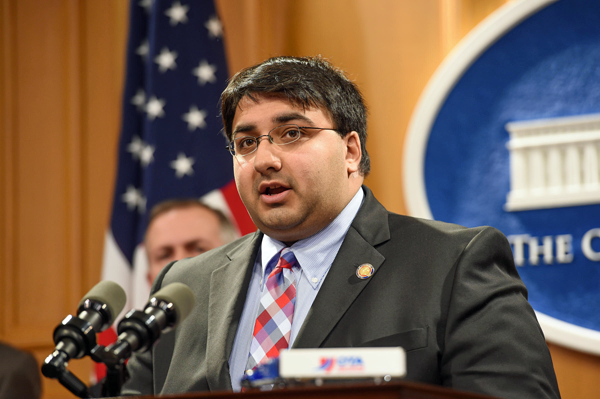
Excerpt from The Guardian
Ohio State Representatives Niraj Antani (R) and Andrew Brenner (R) are proposing a bill to alter policies and practices surrounding campus free speech.
The bill in question, House Bill 758, targets a few sections of the Ohio Revised Code and seeks to enact what is being called the Forming Open and Robust University Minds (FORUM) Act.
“The bill essentially does three things. It bans free speech zones. It bans heckler’s vetoes. It bans universities from compelling students or demonstrators to put up trigger warnings. It also provides the ability for students to take legal action if their free speech rights are curtailed,” said Antani (pictured at right).
Free speech zones are areas in a public space that are specifically designated for protesting or demonstrating. Implicit in the designation is that there are particular areas, outside a given zone, wherein one is not entitled to their freedom of speech. The revisions to Ohio Revised Code sec. 3345.0213 of the FORUM act will ban those designations. The act is limited in scope, however. It largely only designates outdoor areas.
A heckler’s veto refers to the power, whether institutionally grounded or not, of an individual to take action to silence another’s speech. The revision to Ohio Revised Code sec. 3345.0212 states that, “no institution of higher education, or any of its administrators acting in their official capacity, shall prohibit any individual from engaging in noncommercial expressive activity on campus,” with the caveat that their speech not be “materially or substantially” distrustful to the functioning of the institution.
This bill seeks to ban the heckler’s veto and effectively prohibit people from having their free speech blocked. However, neither “heckler’s veto” nor “trigger warning” are mentioned explicitly in the bill.
Proposed language would open up avenues for students “aggrieved by a violation of sections 3345.0212-3” to “bring a civil action against the state, a state institution of higher education, and its employees acting in their official capacities.”
If passed, House Bill 758 would also prevent trigger warnings, or messages presented to the student body regarding the content of a given demonstration.
In September, the anti-abortion activist group Created Equal demonstrated on Wright State’s campus. Gary Dickstein, interim vice president of student affairs, sent out an email the day before notifying the Wright State community and prefacing the demonstration.
Antani characterized Dickstein’s email as a “trigger warning” and claimed that warnings of that nature have the effect of ‘chilling speech’.
“Trigger warnings have been and remain unconstitutional,” Antani said. “What Gary Dickstein did is unconstitutional, and frankly, that’s why this bill exists and we are going to work on getting it through.”
In September Created Equal, an anti abortion activist group demonstrated at WSU prompting the second email notification to students. According to an intern for the organization this is not uncommon.
Evangeline Dunn, intern for outreach for Created Equal said that the university’s emails did not dissuade students from viewing their demonstration. “They have the right to do what they want as long as they don’t infringe on our freedom of speech.”
In a previous Guardian article, Dickstein explained the demonstration policy and notification email that Antani has criticized.
“The policy was not designed to temper or to eliminate the ability for somebody to exercise their first amendment rights spontaneously. But I realize now in talking with our general counsel and looking at it a little bit [that] you could potentially interpret it that way,” Dickstein said.

